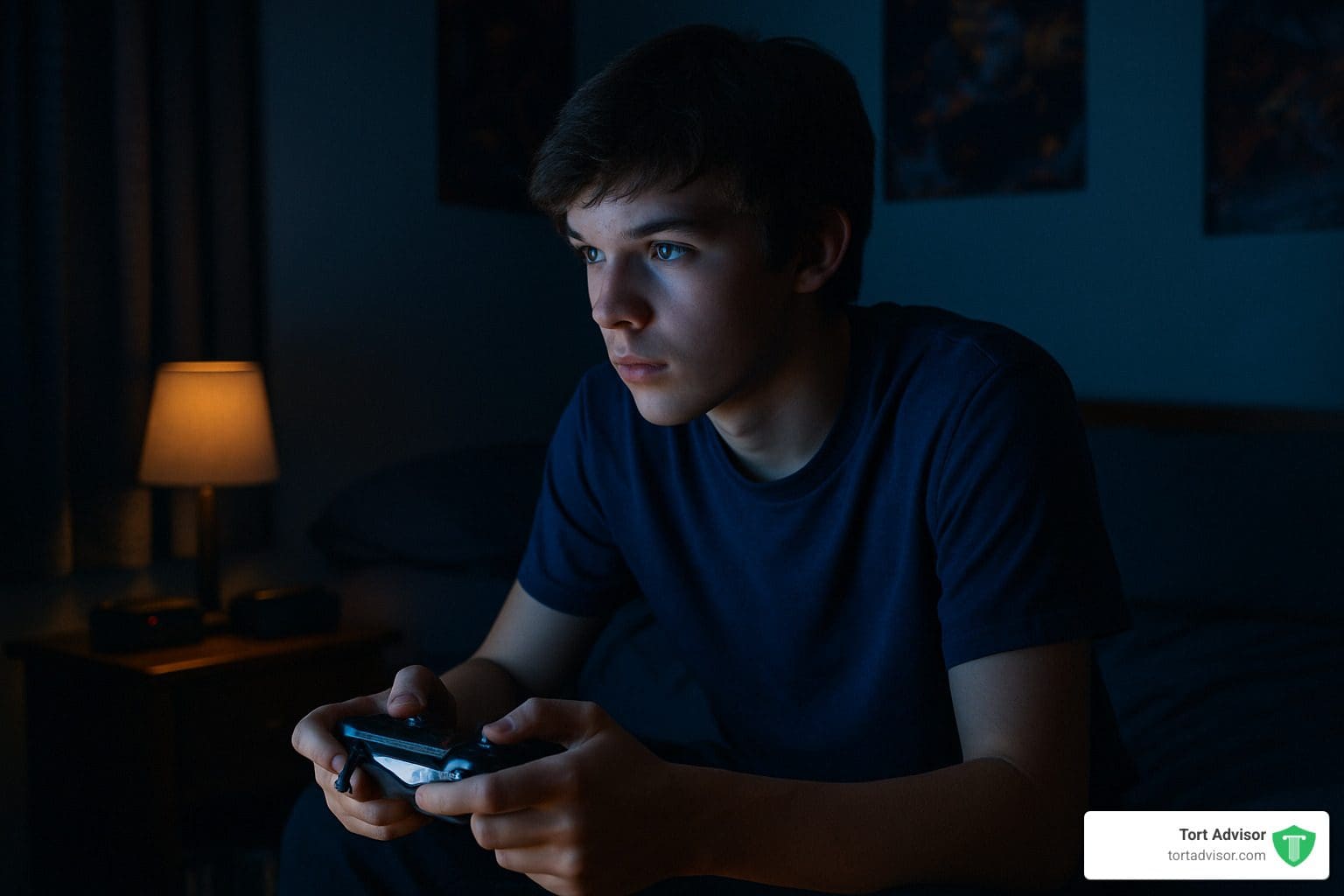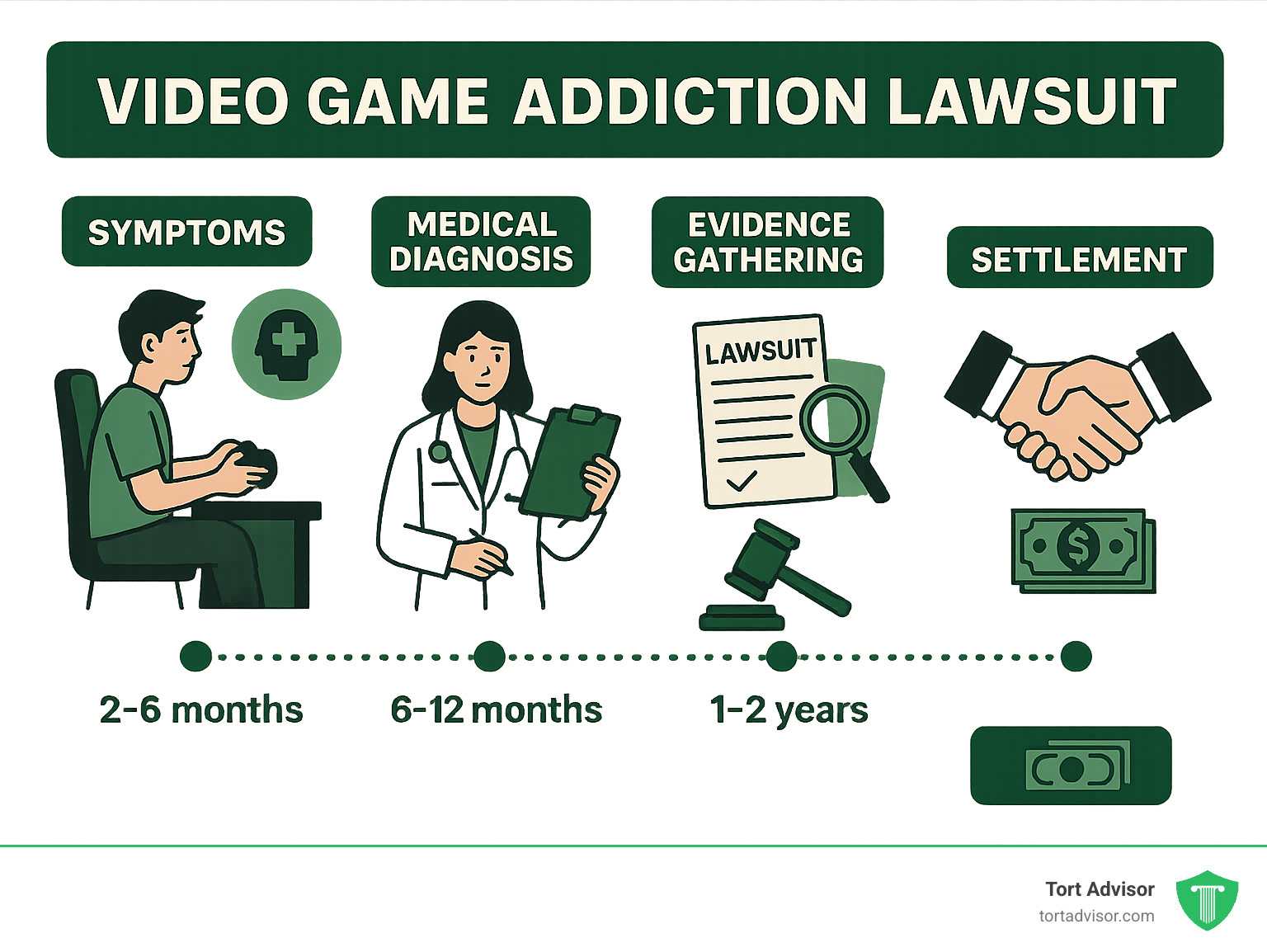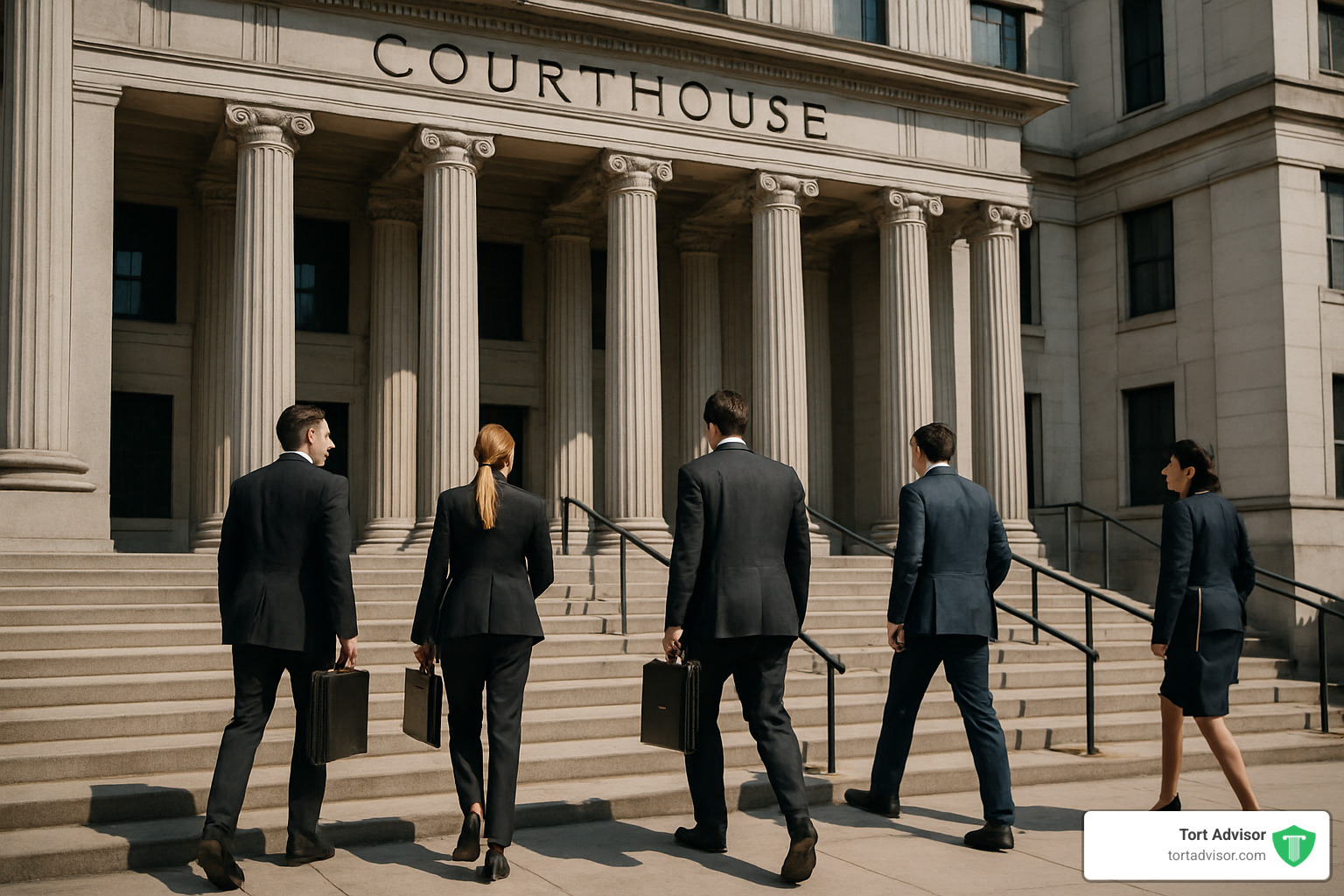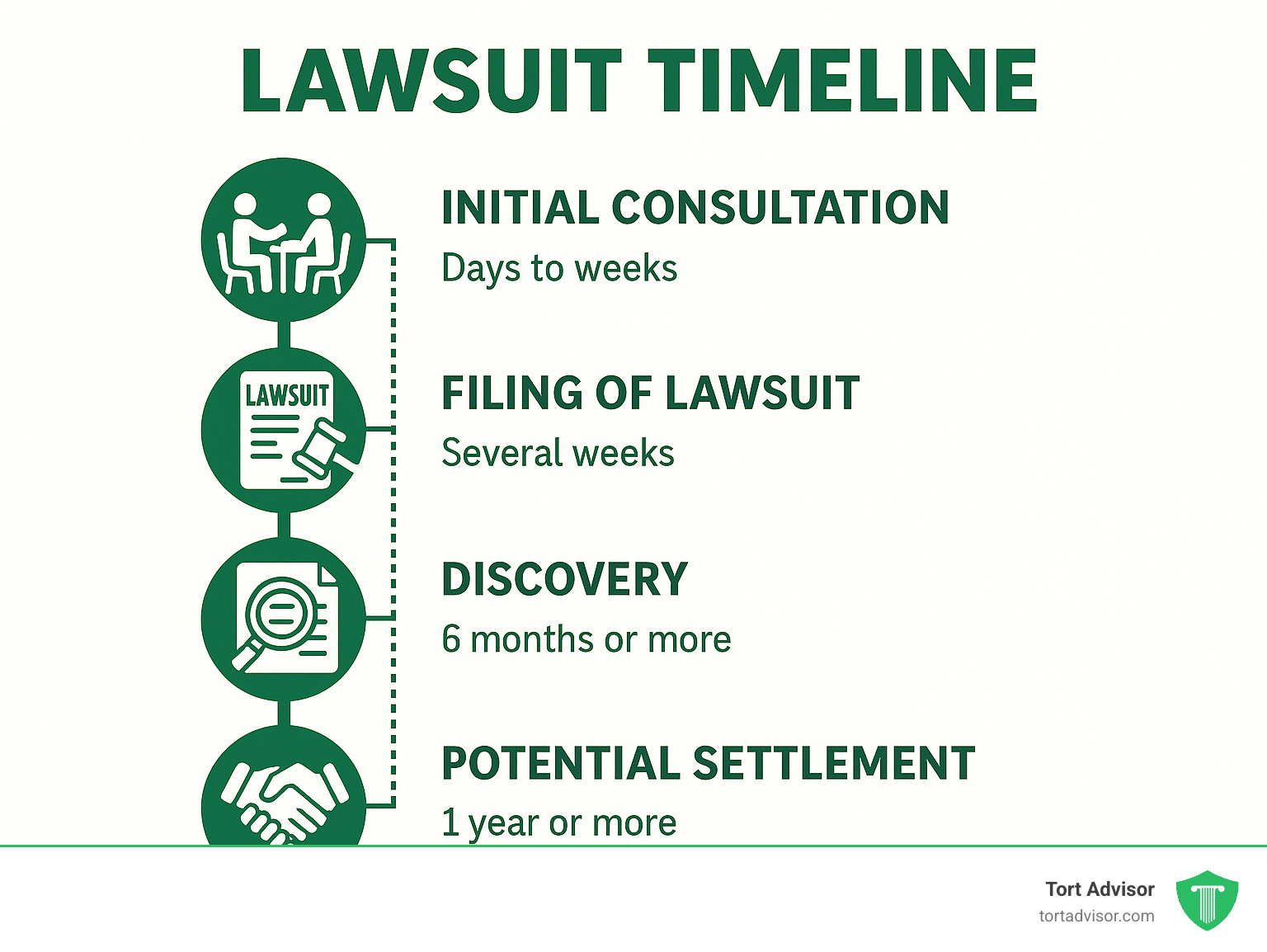


The Gaming Industry Faces Its First Major Legal Reckoning
Video game addiction lawsuit legit concerns are spreading fast as families nationwide file claims against major gaming companies. Here’s what you need to know right now:
Quick Answer: Yes, these lawsuits are legitimate legal cases
- Multiple law firms have filed individual claims in state and federal courts
- Major companies like Epic Games, Microsoft, and Roblox face active litigation
- Claims are based on established legal theories: failure to warn and defective design
- The World Health Organization recognized gaming disorder as a mental illness in 2018
- No class action exists yet – cases are handled individually
The gaming industry generated over $176 billion in 2024, but dozens of families are now claiming that popular games like Fortnite, Roblox, and Call of Duty were deliberately designed to be addictive. Parents report children playing up to 20 hours per day, skipping meals, and showing withdrawal symptoms when gaming is restricted.
These aren’t frivolous lawsuits. Gaming disorder affects 1.2% to 10% of adolescents in Western countries according to medical research. The allegations center on specific game mechanics – loot boxes, microtransactions, and variable reward systems – that plaintiffs claim mirror gambling psychology.
But here’s the catch: no precedent exists yet. These cases are breaking new legal ground, making outcomes highly uncertain. Settlement estimates range wildly from $25,000 to over $350,000 depending on severity of harm.
I’m Mason Arnao, and through my technology company’s work with data management and SaaS platforms, I’ve seen how engagement algorithms are designed to maximize user retention – insights that directly relate to understanding whether video game addiction lawsuit legit claims have merit. My background in internet marketing and system architecture gives me a unique perspective on the technical evidence these cases will require.
The Lawsuits in Context: Public-Health Crisis or Legal Cash Grab?
Skeptics first waved these cases off as quick money plays, but the data keep piling up. When the World Health Organization added gaming disorder to the ICD-11 in 2018, it did so after years of research. The American Psychiatric Association listed Internet Gaming Disorder in the DSM-5 for further study. Meanwhile the industry now earns $176 billion a year, and studies show 1.2 %–10 % of adolescents meet clinical addiction criteria.
Courts are listening. California’s JCCP No. 5363 has already consolidated more than 100 individual claims—evidence that judges see legal merit even without class-action status.
How We Got Here
Modern titles like Fortnite and Roblox run on a “game-as-a-service” model designed to never end. Key mechanics include:
- Loot boxes that mirror slot-machine odds (some wins < 0.1 %). Epic Games has already paid $2.75 million in Canada over related purchases.
- Variable reward schedules—the same intermittent reinforcement casinos use to keep gamblers playing.
- FOMO events and time-limited cosmetics that pressure daily log-ins.
Internal job listings show publishers hiring behavioral scientists to refine these hooks. Plaintiffs argue that’s proof of intent.
Public-Health Evidence vs. Moral Panic
Peer-reviewed work backs the medical side: Kuss & Griffiths (2012) found changes in reward pathways similar to substance addiction; a 2021 APA study linked heavy gaming to depression and anxiety; Dworak (2007) documented sleep and memory disruption. Physical impacts—repetitive-strain injuries, vision problems, posture issues—add another layer of harm.
With brain-scan data, hospital records, and an expanding body of research, this debate looks less like yesterday’s “moral panic” and more like a genuine public-health concern.
Are Video Game Addiction Lawsuits Legit?
Here’s the bottom line: video game addiction lawsuit legit claims aren’t just legal fishing expeditions. They’re real cases built on solid legal ground, backed by medical science, and moving through the courts right now.
These lawsuits rely on legal theories that have worked in other industries for decades. Think about it – we’ve seen similar cases against tobacco companies, pharmaceutical manufacturers, and social media platforms. The legal playbook exists, and attorneys are adapting it to gaming.
Failure to warn is the big one here. Gaming companies allegedly knew their products could hook kids but didn’t tell parents. It’s like knowing your medicine causes addiction but leaving that detail off the warning label. Epic Games, Microsoft, and other major developers had teams of behavioral psychologists designing their games to be as engaging as possible – some would say addictive.
Negligent design claims focus on specific features that serve no purpose except to keep players spending time and money. We’re talking about loot boxes that work like slot machines, dark patterns that trick kids into making purchases, and reward systems designed to create what the industry calls “compulsion loops.”
The courts are taking these seriously. You can see this in the top developer lawsuits making headlines. These aren’t small claims court cases – they’re federal litigation with teams of experienced attorneys on both sides.
Evidence That Makes or Breaks a Case
Not every kid who plays too much Fortnite has a winning lawsuit. The cases that succeed need rock-solid evidence that tells a clear story from normal gaming to actual addiction.
Medical diagnosis comes first. You need a real doctor – usually a psychiatrist or psychologist – who can document Internet Gaming Disorder using the DSM-5 criteria. That means five or more symptoms over 12 months, including things like withdrawal when gaming stops, lying about gaming time, and continued play despite obvious problems.
Gameplay logs are gold in these cases. Most gaming platforms track everything – how many hours you played, when you played, what you bought, how much you spent. This data can show the progression from casual player to someone logging 12+ hours daily. It’s objective proof that’s hard to argue with.
Financial records matter too, especially for families dealing with unauthorized purchases. Some parents find their kids spent thousands on in-game items without permission. These records show both the financial damage and how the games manipulate young players into spending.
Expert testimony will make or break these cases. Attorneys need behavioral psychologists who can explain how loot boxes exploit the same brain pathways as gambling. They need addiction specialists who can testify about withdrawal symptoms and compulsive behavior. They need former game developers who can explain how these systems were designed to be addictive.
Therapy bills and other treatment costs help establish damages. If your family spent money on counseling, residential treatment, or medical care related to gaming addiction, those receipts become part of your case.
Who Actually Qualifies for a Video Game Addiction Lawsuit?
The eligibility requirements are pretty specific. Most successful cases involve young people age 24 or younger when the addiction developed. There’s solid science showing that developing brains are more vulnerable to addiction, and the law often gives minors extra time to file claims.
You need evidence of serious gaming habits – we’re talking at least 2 hours daily for extended periods, not just weekend gaming sessions. Courts want to see patterns of truly excessive use that interfered with school, work, or relationships.
Documented harm is crucial. Maybe grades dropped dramatically, or the person needed medical treatment for gaming addiction. Some cases involve physical health problems from marathon gaming sessions or mental health crises requiring hospitalization.
The good news is that most attorneys handle these cases on contingency fees – you don’t pay unless you win. But that also means lawyers are picky about which cases they take. They need to see strong evidence before investing the time and money these cases require.
Statutes of limitations vary by state but typically give you 1-6 years to file. For minors, the clock often doesn’t start until they turn 18, which can extend the filing window significantly.
Video Game Addiction Lawsuit Legit: Myths vs. Facts
Let’s clear up some confusion about these cases.
The biggest myth is that these are just money grabs by greedy lawyers. The reality? The World Health Organization officially recognizes gaming disorder as a mental health condition. These cases require expensive expert witnesses, extensive medical documentation, and months of investigation. No attorney takes these lightly.
Another myth is that there’s one big class action lawsuit everyone can join. That’s not true. The federal panel that handles multi-district litigation actually denied consolidation. California has coordinated some cases (JCCP 5363) for efficiency, but each person still has to prove their individual case.
Some people think any parent whose kid plays video games can file a lawsuit. Not even close. You need medical diagnoses, expert testimony, and clear evidence of harm. The legal bar is actually pretty high.
Finally, don’t assume gaming companies will just settle to avoid bad press. These companies have deep pockets and experienced legal teams. Some are even using arbitration clauses to keep cases out of public courtrooms entirely.
The video game addiction lawsuit legit question comes down to this: these are real legal cases with real evidence, but they’re also breaking new ground. That makes outcomes uncertain, even for strong cases.
Potential Damages, Settlements & What We Still Don’t Know
No video game addiction lawsuit legit claim has yet reached a jury, so everyone is working from analogies to tobacco, opioid and social-media cases.
- Economic damages: treatment programs ($30k–$50k per month), therapy, tutoring, lost tuition.
- Non-economic damages: emotional distress, family turmoil. Harder to quantify but often the largest share.
- Punitive damages: could dwarf both figures if evidence shows companies knowingly pushed addictive mechanics.
Current attorney estimates break down roughly like this:
- Severe cases: hospitalization or extreme social withdrawal – $100k–$350k+
- Moderate cases: professional treatment with clear life impact – $25k–$90k
- Mild cases: diagnosis with limited lasting harm – $5k–$40k
Early Signs From the Defense
Publishers are adding arbitration clauses and promoting new parental controls—moves plaintiffs’ lawyers see as damage control. The JPML’s refusal to create a federal class action means stories stay personal, but it also raises litigation costs.
Until a bellwether case reaches verdict or a large confidential settlement leaks, every number remains an informed forecast. What is clear: the first few outcomes will set the yardstick for everyone that follows.
How to Move Forward If You Think You Have a Claim
Taking action on a potential video game addiction lawsuit legit claim can feel overwhelming, especially when you’re already dealing with the stress of addiction’s impact on your family. The good news? There’s a clear path forward, and you don’t have to steer it alone.
The first step isn’t calling a lawyer – it’s getting proper medical help. Gaming addiction is a real medical condition that requires professional treatment, regardless of whether you pursue legal action. Contact your healthcare provider or seek out a behavioral addiction specialist who understands Internet Gaming Disorder. These professionals can provide both the treatment your family needs and the medical documentation that strengthens any potential legal case.
While seeking treatment, start documenting everything you can find. Medical records are crucial, but so are the digital breadcrumbs that tell your story. Most gaming platforms keep detailed usage reports – hours played, money spent, session lengths. These objective records often surprise families with just how extensive the gaming has become.
Gather financial statements showing in-game purchases, especially any unauthorized charges. School report cards, work performance reviews, and even family photos showing physical changes can all become important evidence. Screenshots of gaming statistics should be saved immediately, as some platforms delete older data.
The legal side requires specialized expertise. Not every personal injury attorney understands the complexities of gaming addiction cases or the technical evidence they require. Look for firms with experience in product liability, mass torts, or technology litigation – these attorneys understand how to prove that specific game mechanics caused harm.
Here’s where the timeline becomes important. These cases can take years to resolve as attorneys gather evidence, prepare expert witnesses, and steer the complex legal landscape. However, statutes of limitations create real deadlines. Waiting too long can mean losing your right to file entirely, so getting an initial consultation sooner rather than later protects your options.
The financial aspect is often less daunting than families expect. Most attorneys handling these cases work on contingency fees, meaning no upfront costs to you. However, be realistic about the process – these are groundbreaking cases without established precedent, so outcomes remain uncertain.
For families ready to explore their options, our comprehensive Video Game Addiction Lawsuit resource page provides detailed guidance on evidence gathering, finding qualified attorneys, and understanding what to expect from the legal process.
Pursuing legal action doesn’t have to define your family’s recovery journey. Many families find that simply understanding their options provides a sense of control during a difficult time. Whether you ultimately decide to file a claim or focus solely on treatment and healing, having accurate information helps you make the best decisions for your unique situation.
FAQs: Video Game Addiction Lawsuit Legit & More
These are the questions I hear most often from families trying to understand whether video game addiction lawsuit legit claims are worth pursuing. Let me give you straight answers based on what’s actually happening in courtrooms right now.
Is there a nationwide class action?
Here’s what might surprise you: No, and that’s actually good news for plaintiffs. The Judicial Panel on Multidistrict Litigation denied class action consolidation in 2024, which initially disappointed some families who thought a big class action would be easier.
But experienced attorneys know better. Individual cases allow each family to tell their unique story instead of becoming a faceless statistic in a massive class action where everyone gets the same small payout regardless of how severely they were harmed.
California has coordinated some cases under JCCP No. 5363 for administrative efficiency, but each plaintiff still needs to prove their individual harm. This means if your child required hospitalization for gaming addiction, you’re not lumped together with someone who just played too much on weekends.
The downside? Individual cases require more work and documentation. The upside? Families with severe cases can recover significantly more than they would in a class action settlement.
How much could a plaintiff realistically recover?
This is the million-dollar question – literally. Since no video game addiction lawsuit legit case has gone to trial yet, settlement estimates are educated guesses based on similar product liability cases.
Mild cases with documented addiction but limited long-term consequences might recover $5,000 to $40,000. These typically involve kids who received some counseling but didn’t experience major life disruption.
Moderate cases requiring professional treatment with measurable impacts on school, work, or relationships could see $25,000 to $90,000. Think families who spent months in therapy or had to change schools because of gaming-related problems.
Severe cases involving hospitalization, complete social withdrawal, or serious physical health problems could recover $100,000 to $350,000 or more. These are the heartbreaking situations where families lost their child to gaming addiction for months or years.
But here’s the wild card: punitive damages. If plaintiffs prove gaming companies deliberately designed addictive features while knowing they harm kids, punitive awards could dwarf these estimates. Tobacco companies paid billions in punitive damages once their internal documents revealed corporate misconduct.
What does it cost to hire a gaming-addiction lawyer?
The good news is that most attorneys work on contingency fees, meaning zero upfront costs to families. You don’t pay attorney fees unless you win or settle your case.
However, these cases aren’t cheap to pursue. Attorneys typically need to hire behavioral psychologists, addiction specialists, and game design experts as witnesses. Medical evaluations and technical analysis of gameplay data can cost tens of thousands of dollars per case.
Here’s how it usually works: attorneys advance all these costs and recover them from any settlement or verdict. If there’s no recovery, families typically owe nothing for attorney fees, though some agreements may require reimbursement of certain case expenses like expert witness fees.
This is why attorneys are selective about which cases they accept. They’re investing significant money upfront, so they need strong evidence of both addiction and potential recovery to make the economics work.
The reality is that not every gaming habit will qualify for a lawsuit, but families dealing with genuine addiction shouldn’t let cost concerns stop them from getting a case evaluation. Most consultations are free, and you’ll know quickly whether you have a viable claim.
Conclusion
So, are video game addiction lawsuit legit concerns justified? Absolutely. What we’re witnessing isn’t a frivolous legal trend – it’s the inevitable collision between a $176 billion industry and the real families dealing with the fallout from deliberately addictive game design.
These lawsuits represent something bigger than individual claims for damages. They’re forcing a conversation that the gaming industry has avoided for years: What responsibility do companies have when their products harm the people who use them?
The parallels to tobacco litigation are striking. Both industries used sophisticated research to understand how their products affect the brain. Both prioritized profits over user wellbeing. Both initially dismissed health concerns as moral panic. The difference is that gaming addiction primarily affects children and teenagers – making the ethical stakes even higher.
But let’s be realistic about what lies ahead. Proving that specific game mechanics caused individual addiction will be incredibly challenging. Gaming companies have deep pockets and experienced legal teams. They’ll argue that personal responsibility, parental oversight, and pre-existing mental health conditions are the real culprits.
The industry is already adapting. New parental controls, spending limits, and time restrictions suggest companies recognize potential liability. Whether these changes represent genuine concern for user welfare or legal damage control remains to be seen.
For families currently struggling with gaming addiction, the most important step isn’t legal – it’s medical. Get professional help first. Document everything. Then consider whether legal action makes sense for your specific situation.
At Tort Advisor, we’ve seen how emerging legal areas like this can create both opportunity and confusion. Not every attorney understands the complex intersection of behavioral psychology, technology design, and product liability law that these cases require. That’s why we work exclusively with specialists who have proven track records in similar litigation.
The legitimacy question has been settled. These lawsuits are real, they’re based on established legal principles, and they’re moving forward in courts across the country. Whether they’ll succeed in creating meaningful industry change depends on how well attorneys can prove what many families already know – that these games were designed to be irresistible, especially to young people.
If you believe you have a claim, time matters. Evidence disappears, witnesses forget details, and statutes of limitations create hard deadlines. Visit our comprehensive Video Game Addiction Lawsuit resource to understand your options and connect with qualified legal representation.
The gaming industry’s legal reckoning isn’t coming – it’s here. The real question isn’t whether these companies will face accountability, but whether that accountability will come soon enough to protect the next generation of players from the same harm.
Free Confidential Case Evaluation
Complete the short form below to get an immediate FREE case review with an expert in your specific claim. Don't wait, your case could be time sensitive to file a claim.
Related Posts
Did a North Dakota product cause harm? Understand product liability, your rights, and how to take action for defects.
Get justice for clergy abuse. Find an expert Priest abuse lawyer to navigate complex laws and hold institutions accountable.
Diagnosed with meningioma after Depo-Provera? Understand potential Depo-Provera lawsuit settlements, risks, & how to claim compensation.
Uncover the truth about uber sexual assault cases. Learn about the alarming scale, Uber's accountability, and legal options for justice.
Facing wildfire losses? Discover the best wildfire lawsuit attorneys in California to fight for your full recovery and justice.
Exposed to Roundup & diagnosed with NHL? Discover how to sue Monsanto, understand eligibility, & seek compensation. Your guide to justice.









